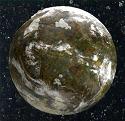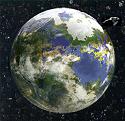Neven Solar System: Difference between revisions
Turc Brakur (talk | contribs) |
Turc Brakur (talk | contribs) |
||
| Line 103: | Line 103: | ||
*[[ma:Class H|Class H]] | *[[ma:Class H|Class H]] | ||
*Uninhabited | *Uninhabited | ||
*Age: 4 billion years | |||
*Diameter: 14,200 km | |||
*Location: Cold zone | |||
*Surface: Cold desert | |||
*Atmosphere: Breathable | |||
*Life Forms: Cold resistant plants | |||
The last in the Neven system. It is a cold desert planet, similar to the tundra of northern Canada on Earth. The only lifeforms on the planet are research scientists stationed at a temporary research station located at the planets north pole. | |||
<br><br><br><br><br><br> | <br><br><br><br><br><br> | ||
Revision as of 03:53, 6 February 2009
| USS Challenger | ||
|---|---|---|
 LOST | ||
| ||
Solar System: Neven
The Neven Solar System is made up of six planets of various planetary classifications.
Neven Sun
- Sun
- Uninhabited
Neven I
- Class D
- Uninhabited
- Age: 3.9 billion years
- Diameter: 3,694 km
- Location: Hot zone
- Surface: Rocky
- Atmosphere: None
- Life Forms:None
Class-Ds are also known as Plutonian objects and are generally not considered true planets. Like all other Class-D planets, Neven I is not suitable for humanoid life, although it has been investigated for possible automated mining operations. Currently, not enough minerals are present to warrant mining activities.
Neven II
- Class F
- Uninhabited
- Age: 2.8 billion years
- Diameter: 12,530 km
- Location: Ecospere
- Surface: Volcanic
- Atmosphere: Carbon dioxide, ammonia, methane
- Life Forms: Simple Bacteria
Neven II is a Class-F world with heavy volcanic activity. Steam expelled by volcanoes is believed to be the source of shallow oceans where simple bacteria thrive.
Neven III
- Class L
- Terraformed
- Age: 3.3 billion years
- Diameter: 13,050 km
- Location: Ecospere
- Surface: Rocky, little surface water
- Atmosphere: Breathable
- Life Forms: Currently none, a colony is in the works
Neven III is Neven IVs first attempt at terraforming a colony world. Currently, the planet is 15 years off from being ready for colonization. Within the next 5-10 years, plants from Neven IV will be introduced, following that animal and finally colonists will be brought over.
Neven IV
- Class M
- Inhabited
- Age: 3.8 billion years
- Diameter: 13,600 km
- Location: Ecospere
- Surface: Abundant surface water, temperate climate
- Atmosphere: Breathable
- Life Forms: Vegetation, animal, humanoid (Nevenian)
Neven IV is the Neven systems only inhabited world. It is approximately 38% surface water. It is the home to the Nevenian people. Neven IV has one small moon.
Neven V
- Class K
- Uninhabited
- Age: 3.8 billion years
- Diameter: 10,000 km
- Location: Cold zone
- Surface: Barren
- Atmosphere: Very thin
- Life Forms: None
This is the first planet in the Neven systems cold zone. It is a very cold planet with a thin atmosphere. It is incapable of supporting life. Automated mining drones, in conjunction with a mining station in orbit, collect resources for the population of Neven IV.
Neven VI
- Class H
- Uninhabited
- Age: 4 billion years
- Diameter: 14,200 km
- Location: Cold zone
- Surface: Cold desert
- Atmosphere: Breathable
- Life Forms: Cold resistant plants
The last in the Neven system. It is a cold desert planet, similar to the tundra of northern Canada on Earth. The only lifeforms on the planet are research scientists stationed at a temporary research station located at the planets north pole.







